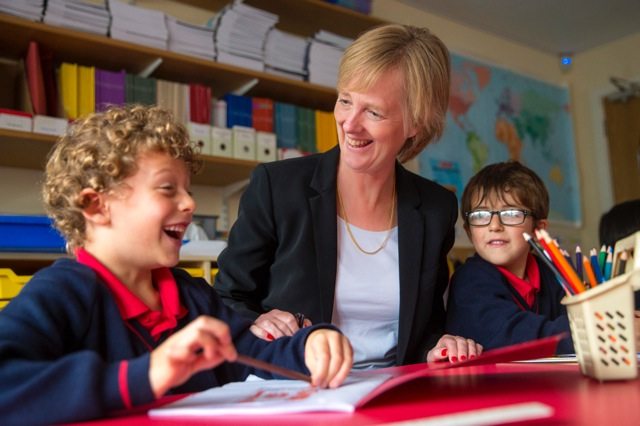Striving for Excellence – Decoding OFSTED and ISI reports by Sarah Gillam, Headmistress, Maple Walk School and ISI Inspector
Choosing the right school for your child is daunting. All parents want the best for their children and navigating through reams of glossy brochures and slick presentations is overwhelming. Add to this the, ‘word on the street’ and it is remarkable that any parent survives school selection, without having to retreat into a darkened room. However, there is a short cut: the Inspection Report. Decode what their language actually means and you could save yourself a fortune in registration fees.
Many parents will be familiar with the Ofsted ratings of Outstanding or Good whilst the ‘Requires Improvement’ rating will have parents decamping to a school within a better catchment. But most independent schools do not work with Ofsted and instead are regulated by the Independent School Inspectorate. The ISI do not give over-arching grades and instead key areas, such as the ‘contribution of teaching’ or the ‘quality of leadership and management’, are judged and scored separately. Grades are awarded from ‘unsatisfactory’ at the bottom end, right up to ‘excellent’ and, in some rare cases, the curriculum can be judged as ‘exceptional’. Knowing what these judgements actually mean can be a powerful weapon in a parents’ arsenal. Reports are, according to the ISI, designed to “provide objective and reliable accounts of the standards of provision within a school.” They also provide sign posts for the schools being inspected; to assist them in building on their strengths or to encourage them to remedy any weaknesses.
A good school will not arrogantly march forward, ignoring inspectors’ recommendations, but instead will genuinely see these as an opportunity to strive to be better. As the old joke goes: How many inspectors does it take to change a light bulb? None — it will either change itself, or be failed! And whilst inspectors (and schools) have an awful lot of boxes to tick, team members have at their hearts a genuine interest in, and concern for, children’s education. Unlike Ofsted inspectors, ISI panels have at least one serving Head Teacher from a member of the Independent Schools’ Council Association. At the ‘exceptional’ level a school will not only have weighty ambitions for their pupils’ achievements, but they will also have fulfilled these to the hilt. Success is measured not just by what happens in the classroom, but by a school’s extra-curricular activities, the attitude of their pupils and their ability to concentrate and to be engaged.
It goes without saying that pupil achievement will be way above the national average. All pupils, including those with special educational needs (SEND) or English as an additional language (EAL), will be judged on their individual progress and their approach to learning. For SEND and EAL pupils, this will be gauged by how rapidly they improve from their starting point, or in accordance with their Individual Education, Care and Health Plans. In effect, there is nowhere to hide for schools that blame poor results on an unusually high number of ‘challenging’ pupils. Conversely, a highly selective school that sits back on its laurels may not achieve as well as a non-selective school that recognises the need to challenge all pupils according to their individual ability.
To this aim, marking and feedback to pupils and parents should be consistent and focused on assessing progress and guiding development. A lot of red marks will only demoralise, rather than encourage pupils to identify the areas they need to improve and children themselves need to be seen to be engaged in the assessment and marking process. The curriculum should be stimulating; creative and expressive subjects “strongly represented in regular work”, a foreign language taught from an early age and the computing and library learning integrated within the curriculum. It is easy to be wowed by impressive and expansive facilities, and these certainly help a school on the road toward ‘excellent’, but even small schools, with limited budgets, should compensate by making sure facilities nearby are utilised or that school trips make the best use of their surrounding environment. Regular outings on foot to the local swimming pool should not, therefore, be rejected in favour of an underused Olympic-sized facility on site. Similarly, rows of brand new ipads are only as good as their integration and use within the whole curriculum. The spiritual, moral, social and cultural development of pupils is also scrutinised.
According to ISI criteria a school graded excellent in this area will have pupils that “show a keen sense of fair play” and also an awareness of those less fortunate than themselves. Alongside this, schools should regularly engage with the local community and fundraise for a range of charities, in order to develop pupils’ social and moral responsibility. Fierce debate is encouraged, whilst appreciating pupils from all social backgrounds and nationalities.
This is underpinned by the topic of the day, ‘fundamental British values’. In the course of their inspection, the ISI team will look at pupils’ work, talk to management, question pupils and parents and, perhaps crucially, observe lessons. Excellent teaching needs to be nurtured. This means that teachers should be supported, encouraged, well managed and given regular opportunities to keep up to date with their specialist subjects. A lack of investment in staff development can lead to stagnated teaching and a high staff turnover, so look for a school that provides ongoing opportunities for training.
Inspections should be detailed, rigorous and unbiased. And whilst they can cause a wave of panic to ripple through a school (typically only three day’s notice of an imminent inspection is given), a good school should have an attitude of ‘bring it on’. A school will be under regulatory scrutiny too – safe recruitment, health and safety, governance, policies and procedures. These essential aspects and their associated documentation of school life cannot be conjured up overnight and so there is a good chance that if the ship is not in order on the big day…it probably hasn’t been for a while.
This year the inspection process is set to have a big shake up, in line with the Government’s desire to bring independent schools to heel like Ofsted inspected schools, but in the interim, existing reports can offer enormous insight. Parents should, however, trust their own instincts and no amount of reading or decoding can replace actually visiting a school. And what a report cannot tell you is, whether a particular school is the right school for your child.










